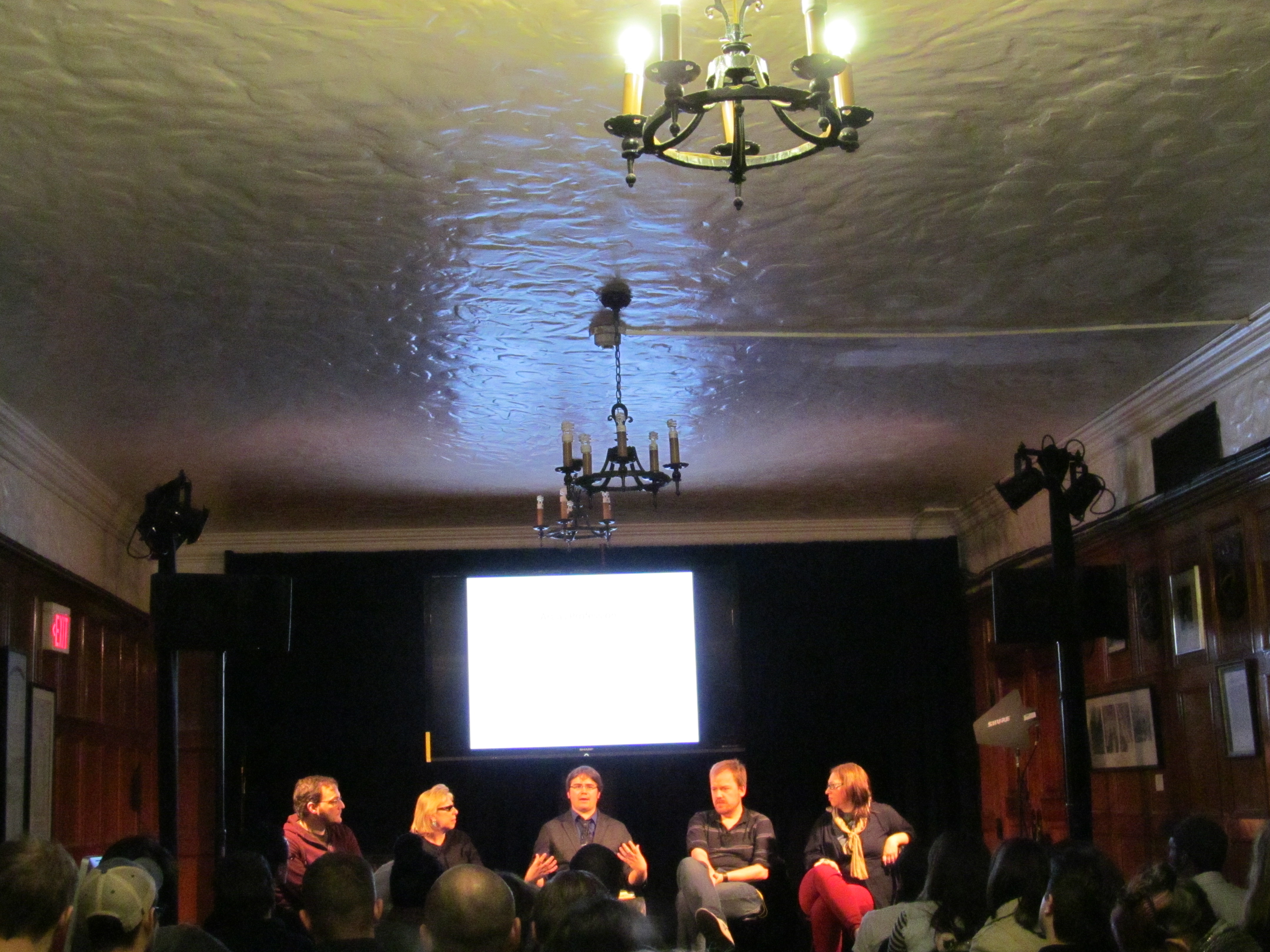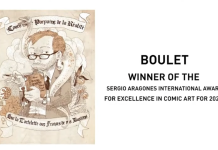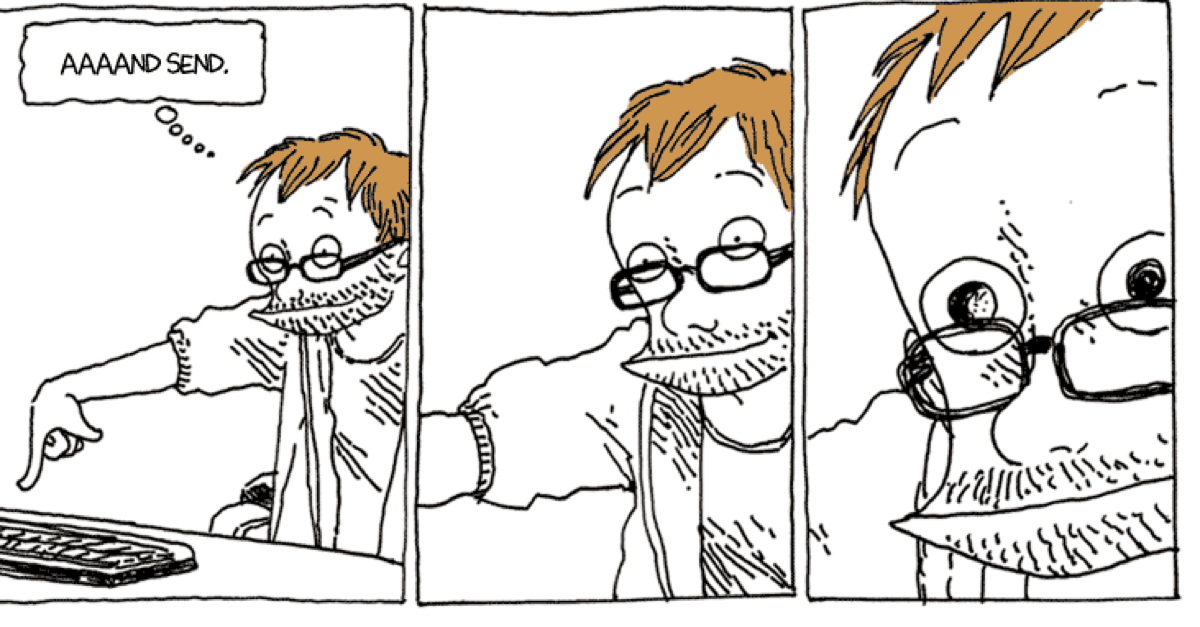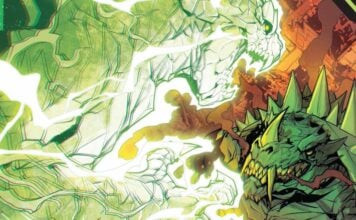Holding panels in the wood-panelled bowels of the Armory this year at MoCCA Fest did bring a certain gravitas to the proceedings even if the location was a little difficult to locate for the unfamiliar. When I arrived at the “Art as Profession: Creating, Promoting, and Making Money in Comics” panel at 11:30 on Sunday the 7th of April, the room was already packed and couldn’t have squeezed in more than a couple more inquisitive souls. Judy Hansen (of Hansen Literary), Micah Spivak (of the Scott Eder Gallery), George Rohac (of Oni Press and Benign Kingdom), and Boulet (Gilles Roussel) appeared in a discussion moderated by The Beat’s own Heidi MacDonald.
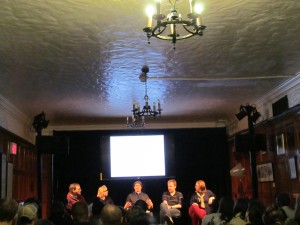
Boulet clarified that the “general situation of comics in France is very different”. Though the “work is fantastic”, he said, for himself, he’s like the “winner of a lottery” with his successes in webcomics, and therefore “not a good example” of the standard experience of indie artists. He described a “deeper and deeper crisis last year in comics because of the big boom” of webcomics in the early 2000’s, a period which produced “too much production”, and caused the pay for artists to fall. “It’s never been easier to publish a book”, he said, since there are “20 or 30” publishers to appeal to, but the pay, now, unfortunately, is “scandalous”. The figures for pay that he cited suggested a drop of more than 60% from pay at the beginning of the millennium. McDonald, thinking over the numbers, confirmed that the pay in France right now is similar to the lowest rates for comic artwork in the USA.
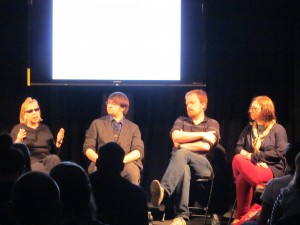
“Everything is free now on the internet”, McDonald pointed out as the “elephant in the room”, posing the greatest challenge to making money in comics. So what is the “path” to becoming a professional cartoonist these days, she asked. Hansen provided a number of significant points of advice to the audience. The “right attitude”, she said, is paramount, as well as “meeting deadlines, whatever they are”, as well as “producing and submitting” on time “even if 5 years away”, so that “publishers can plan”. She clarified that if you’re simply self-publishing on your own, you have more leeway, but if you want “channels of distribution”, you have to commit to firmer schedules in order to succeed. As an agent, she has witnessed a successful pitch become a “disaster” when the creators tried to expand and complete the project because they “hadn’t thought it through” in terms of story, arc, or character, wasting a prime opportunity for success.
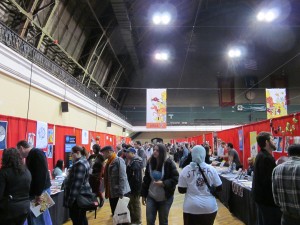
The conversation amongst panellists then shifted to Kickstarters and how they have impacted the success of webcomics. Rohac’s experience overseeing many successful Kickstarters made him an ideal voice for the subject. He has assisted in 24 Kickstarters, he said, and helped raise 3.6 million dollars in 1 ½ years time. His advice working on Kickstarters is to “be professional” when working with publishers, and develop “professional techniques” by observing others and asking for help when needed. Boulet said that Kickstarters in France are moderately successful but they are still “not as important” in France as in the USA. His general advice when dealing with publishers is to avoid being “desperate to accept anything” as he has seen many young cartoonists accept denigrating deals on their work in the interest of simply getting published.
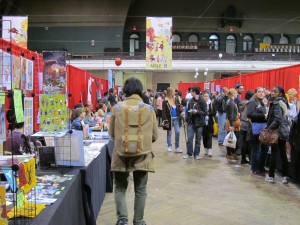
Before the Q and A started, Rohac, Boulet, and Hansen all rallied around a final piece of good advice: to seek legal counsel as a creator of comics, enabling you to properly read any contracts before signing them. Boulet added, from his own experience, “never accept to be paid later” since that’s in breach of contract, too, no matter what financial troubles a company may encounter.
Hansen was asked, during the Q and A, what she thinks about the role of adaptation right now in the comics market, and she replied with two examples from her observations as an agent. A WRINKLE IN TIME, she said, was very successful because it tapped into a classic children’s literature market with a fan-base, whereas the graphic novel of THE HOBBIT hasn’t done so well because it was produced before the opportunity for a movie tie-in and faced a lot of competition in other formats. Rohac and Hansen commented on methods for finding a good agent to work with and advised against “cold calling” agents since “finding someone to work with takes time”. Hansen explained that many agents are interested not simply in a single work’s success, but in “career building” for their clients and are looking for “match making” between a client and a publisher, and so getting to know the comics artists is very important to this process rather than rushing things.
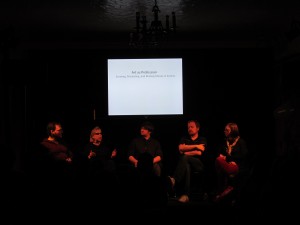
The “Art as Profession” panel was replete with words from the wise, many of them pretty hard-hitting, but good advice can be hard to come by, especially in this state of digital flux for comics, and so the panel itself was not only a useful, but a lively focus for many of the problems and questions artists are facing right now.
Hannah Means-Shannon writes and blogs about comics for TRIP CITY and Sequart.org and is currently working on books about Neil Gaiman and Alan Moore for Sequart. She is @hannahmenzies on Twitter and hannahmenziesblog on WordPress.

